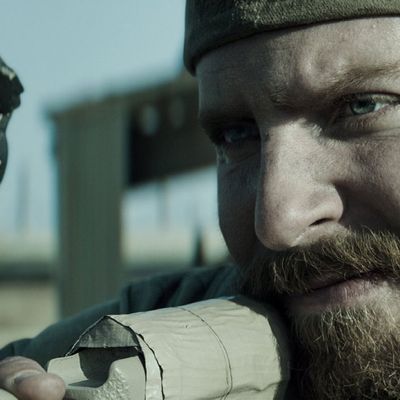
Spouting off to an empty chair at the 2012 Republican National Convention, Clint Eastwood looked as if he were slipping into doddering dementia, but he’s shrewder and more focused than ever in his Iraq War picture American Sniper. It’s a crackerjack piece of filmmaking, a declaration that he’s not yet ready to be classified as an Old Master, that he can out-Bigelow Kathryn Bigelow. Morally, though, he has regressed from the heights of Letters From Iwo Jima (2006). In more ways than one, the Iraq occupation is seen through the sight of a high-powered rifle. The movie is scandalously blinkered.
Its springboard is the tragically murdered Chris Kyle’s best-selling memoir (written with Jim DeFelice), which chronicled his tours in Iraq as a Navy SEAL and his acquisition — thanks to an unprecedented number of sniper kills — of the sobriquet “the Legend.” I’m not going to fault Kyle’s view of his enemies as representing a “savage, despicable evil,” but I do fault Eastwood for making what is, essentially, a propaganda film.
The script, by Jason Hall, shows Kyle (Bradley Cooper) watching the Twin Towers fall on 9/11 and enlisting, having learned from his dad that the world consists of “sheep, wolves, and sheepdogs,” and that he must be the last — a protector. Then, after disarming and winning a woman named Taya (Sienna Miller), he’s off to Iraq, with no indication that the two events — 9/11 and the Iraq invasion — have been yoked together by unscrupulous politicians who don’t have a clue what lies in store for American soldiers. As in many jingoist war movies, the native population are portrayed as invaders of our sacred space instead of vice versa. Hall provides a supervillain, a crack shot named Mustafa (Sammy Sheik) who hunts the Legend, with Eastwood laying on the growly doomy music whenever Mustafa appears. Their face-off gives American Sniper a conventional, suck-on-this climax.
In the latest Hunger Games movie, Philip Seymour Hoffman’s PR guy, Plutarch, views propaganda footage of Katniss Everdeen and says, “It’s a little on the nose, but of course so is war.” He could be talking about American Sniper. A fellow sniper tells Kyle as he takes aim at a potential insurgent, “If you’re wrong, they send your ass to Leavenworth” — which would be news to a lot of soldiers who got it wrong without consequences. When Kyle goes back to Iraq, Taya (now with their son and daughter) says, “I don’t think we’ll be here when you get back.” And you just know, as soon as Kyle’s buddy asks him to be his best man, that in a few moments, the guy will be history.
Eastwood does stage a scarily amorphous final battle in a sandstorm, and Cooper is very impressive. Best known for more congenial roles, he plays Kyle as grimly self-contained, both hyperalert and alienated. Kyle is put through the kind of training that would drive most men insane and, newly honed, gradually realizes that he’s now fit to do only a few things — protect other Americans, avoid being killed, and kill — and that he’ll never fully recover his old self. But Eastwood — who never directed a better scene than the one in Unforgiven when the protagonist shoots a basically harmless man and has to listen to his excruciating death throes — makes the moral stakes almost nonexistent. The people Kyle shoots always represent a “savage, despicable evil,” and the physical and mental cost to other Americans just comes with the territory. It’s a Republican platform movie.
*This article appears in the December 29, 2014 issue of New York Magazine.


